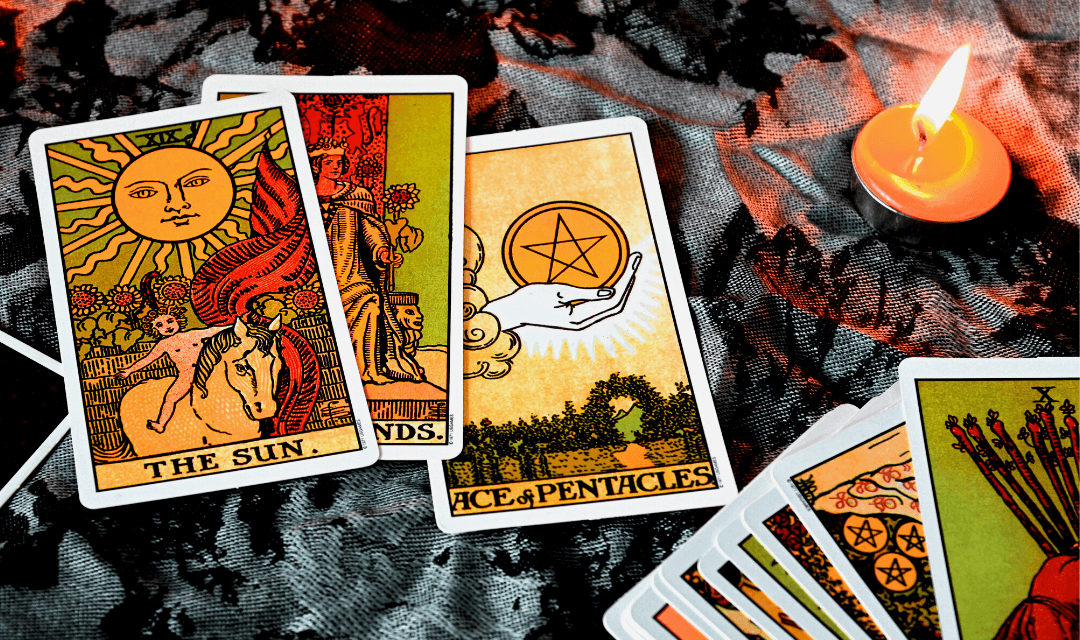Understanding how tarot works can help us see why it might be attractive to some for divination and self-awareness. To see the cards is to see yourself. Tarot decks are made up of seventy-eight cards divided into two sections, the Major Arcana and the Minor Arcana. Arcana is Latin for “secrets” or “mysteries.” Think of the tarot as unlocking the mysteries of life. The Major Arcana is comprised of twenty-two cards that represent life’s biggest events. For instance, the Fool card indicates a beginning, and Death card an end. The Wheel of Fortune card alludes to change while the Lovers Card points to potential partnerships. Each of the twenty-two cards in the Major Arcana is important, and when one appears in a tarot reading, great attention is usually given to it. As for readings, it all begins with the shuffle. During the shuffle, the person being read is supposed to concentrate on what they want to know, the wisdom they are seeking. Indeed, tarot cards do contain some Christian images, from crucifixes to angels to even the Devil himself. But tarot is more than art. It is art designed with divination in mind. Alongside Christian imagery is occultic imagery, including pentacles, wands, and astrological signs. Despite some Christian tarot card readers’ desire to cleanse the deck with Christian meanings, it’s still an occultic tool. However, just as a Christian shouldn’t use an Ouija board to hear from the Lord or go to a psychic as a means to prophecy from God, Christians should avoid using tarot to enhance their prayer lives. There are Christian cards and Christian readers. Yet, something is amiss. Sorcery and magic are against God’s Word. Spiritual forces of the world are not the spiritual forces of God. Tarot will not send you on a path toward righteousness but on one toward destruction. Find restoration for your soul in God’s Word, not in a deck of cards created by man for his own pleasure and self-knowledge.
This Postmodern Realities episode is a conversation with JOURNAL author Lindsey Medenwaldt about her online-exclusive article, “Divination and Contemplation-Tarot’s Impact on Culture and Christianity”.
Locked articles are online exclusive content that are only available to subscribers. There are three subscription options to access our online exclusive content.
1. Subscribe ($33.50) to the print edition of the Christian Research Journal which includes all online exclusive content.
2. Pay a monthly fee ($4.99) for Christian Research Journal online exclusive content. This does not include online versions of current print edition articles or receiving the print issues.
3. Pay an annual fee ($24.99) for Christian Research Journal online exclusive content. This does not include online versions of current print edition articles or receiving the print issues.
For more information and to subscribe please click here.
Note online-exclusives are eventually made available to the public at regular intervals but to gain access to read it when it’s originally posted subscribing at the link above is the best option.
When you to subscribe to the Journal, you join the team of print subscribers whose paid subscriptions help provide the resources at equip.org that minister to people worldwide. These resources include our ever growing database of over 1,500 articles, as well as our free Postmodern Realities podcast.
Another way you can support our online articles is by leaving us a tip. A tip is just a small amount, like $3, $5, or $10 which is the cost for some of a latte, lunch out, or coffee drink. To leave a tip, click here
